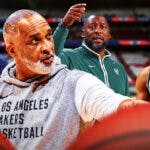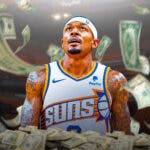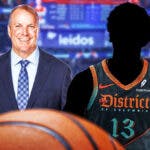Bradley Beal is one of the biggest trade candidates in the NBA right now. However, the Washington Wizards are better off keeping their homegrown star, rather than trading him and embarking on a severe rebuilding project.
There is merit behind the Wizards potentially trading Beal, especially if he rejects the three-year extension worth roughly $112 million that's on the table. He's one of the best wings in the NBA, and the Wizards missed the playoffs last season and don't project to drastically improve next season with John Wall set to miss the entire campaign.
Beal is coming off the most productive season of his career. Averaging a career-high 25.6 points, 5.5 assists, and 5.0 rebounds, he was the Wizards' No. 1 source of offense and one of the most productive players in the sport. He can score off the dribble, is a dependable outside shooter, and can hit crunch-time shots.
Theoretically, the Wizards should be able to get back a haul for Beal's services in a trade. Beal still has two years left on his contract, and while suitors would like him to commit for the long haul, there are always teams willing to take a big gamble on acquiring a star before he hits free agency. It's a development that benefits the team trading the player.
So, let's wheel and deal. Say the Wizards trade Beal for a couple of promising young players and draft picks, as well as an expiring contract to match Beal's $27 million salary for the 2019-20 season. Where does that leave the Wizards' sudden youth movement?

The Wizards drafted forward Rui Hachimura with the ninth pick in June's NBA Draft; he could very well be a sleeper. The Gonzaga product has a steady skill set and, generally speaking, fell under the radar before the draft. Perhaps he becomes a long-term piece to the puzzle.
Thomas Bryant and Davis Bertans are solid players, but they aren't exactly high-ceiling guys. Troy Brown Jr. is largely unproven. The Wizards acquired Moritz Wagner, Jemerrio Jones, and Isaac Bonga from the Los Angeles Lakers to help them clear cap space. While the three of them could improve with more consistent playing time, it's a stretch to expect them to become difference-making players overnight, or even over the next two years.
Meanwhile, head coach Scott Brooks has veteran point guards Isaiah Thomas and Ish Smith, forward C.J. Miles, and center Ian Mahinmi in his rotation.
Does this seem like a team that could be a sleeper in the East, or become one of the best young cores in the NBA?
There's also the John Wall element.
One of the most in-depth rumors of the summer has been that the Miami Heat are interested in trading for Beal, and potentially even willing to take on Wall as well.
What is the Wizards' incentive to do such a deal?
Getting Wall's contract, which pays him in excess of $38 million a season, off the books and ridding themselves of the long-term injury concern after his Achilles surgery.
Say the Wizards do this deal. What does it do for them? Cap space can be fool's gold, and essentially using Beal to get rid of Wall would be asinine.
The Wizards would be getting back an underwhelming draft haul, as the Heat would be taking on two max contracts, which in this scenario is supposed to be the featured element of the deal for Washington. Is getting rid of your two franchise players for the sake of cap relief and minuscule draft compensation going to attract free agents to the nation's capital? Plus, what message does it send to your fan base?
Sure, the Wizards have continually hit a wall in the postseason and been unable to get over the hump with Wall and Beal leading the way. But there's value to being competitive and sticking with your core. It keeps your fan base engaged, builds camaraderie with your roster, and gives you a fighting chance to win in the postseason.

The Wizards are going through extremely challenging times. Their two stars have uncertain futures, and there are limited building blocks behind them; it's virtual NBA purgatory. But when this scenario presents itself, you have to grind through it.
Beal became the driving force of the Wizards' offense when Wall went down, and he answered the call — although Washington missed the playoffs. Couldn't you argue that when Wall returns to the floor, Beal will be even more dangerous? He has extended experience being both the No. 1 and 2 source of an offense, from both a scoring and playmaking standpoint.
The Wizards put themselves in this stagnant situation. Trading Otto Porter Jr. to the Chicago Bulls for the expiring contracts of Jabari Parker and Bobby Portis at last season's NBA trade deadline just to let them walk in free agency only worsened the situation. Porter is one of the best 3-and-D players in the NBA and a crucial part of the Wizards being a playoff fixture, and management traded him for the sake of getting his $27 million salary off the books and acquiring some second-round draft compensation.
The Wizards dished out roughly $405 million to Wall, Beal, and Porter; that was their choice. New general manager Tommy Sheppard has to right the decisions made by his predecessor, Ernie Grunfeld. He has been dealt a difficult hand, and he has a pivotal decision to make with the team's starting backcourt.
For his sake, as well as that of the Wizards, keeping Beal is the best course of action.
Trading Beal doesn't significantly enhance the prospect of rebuilding, as they don't have a special young core to build around to begin with.
Packaging Beal with Wall would mean the Wizards traded their three best players for cap space.
Keeping Beal gives the Wizards a chance to retool over the next two years and perhaps work their way back to the top of the conference. Beal and Wall have long been one of the best backcourts in the NBA. They're in the prime of their careers, play well together, and have continuity.
Hey, it's the Eastern Conference, and anything can happen.




